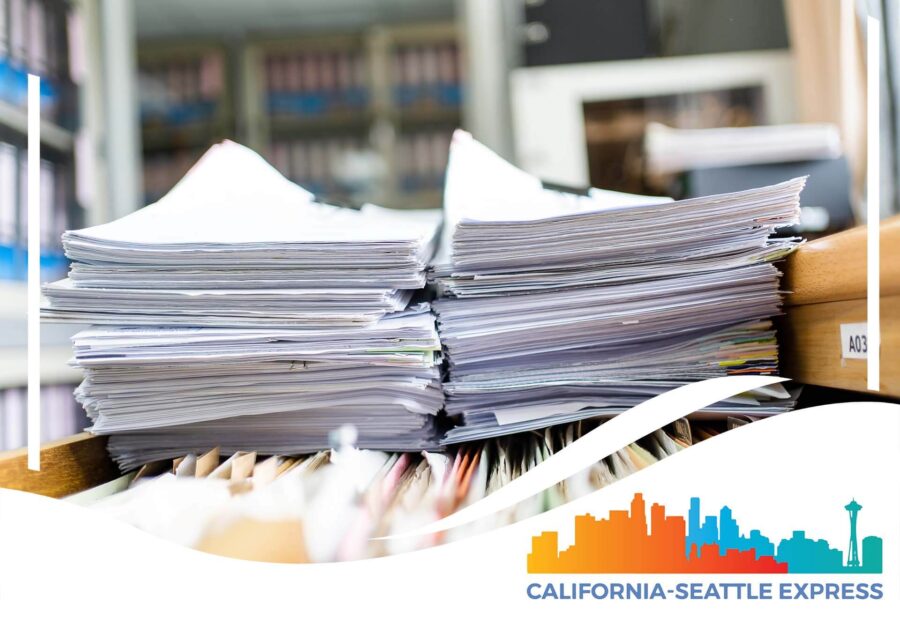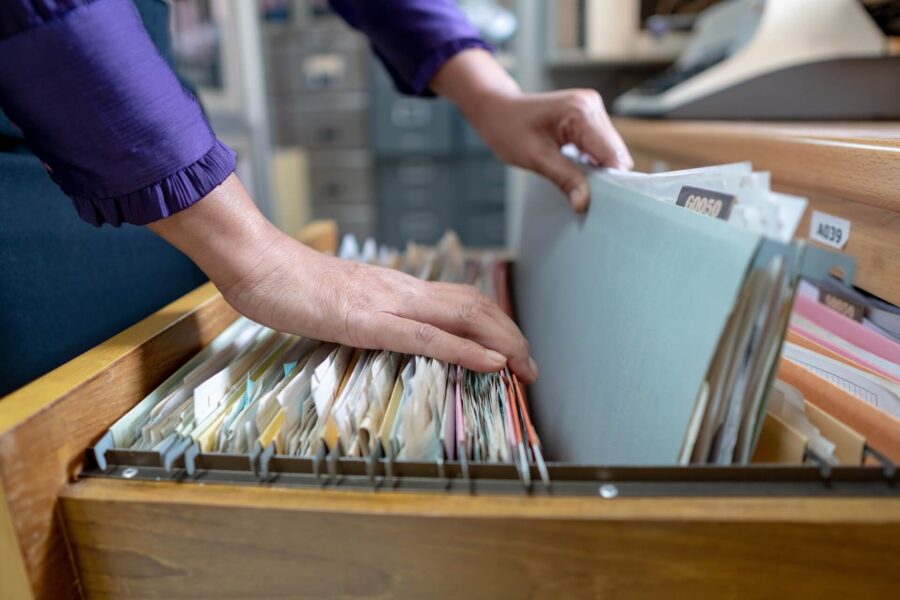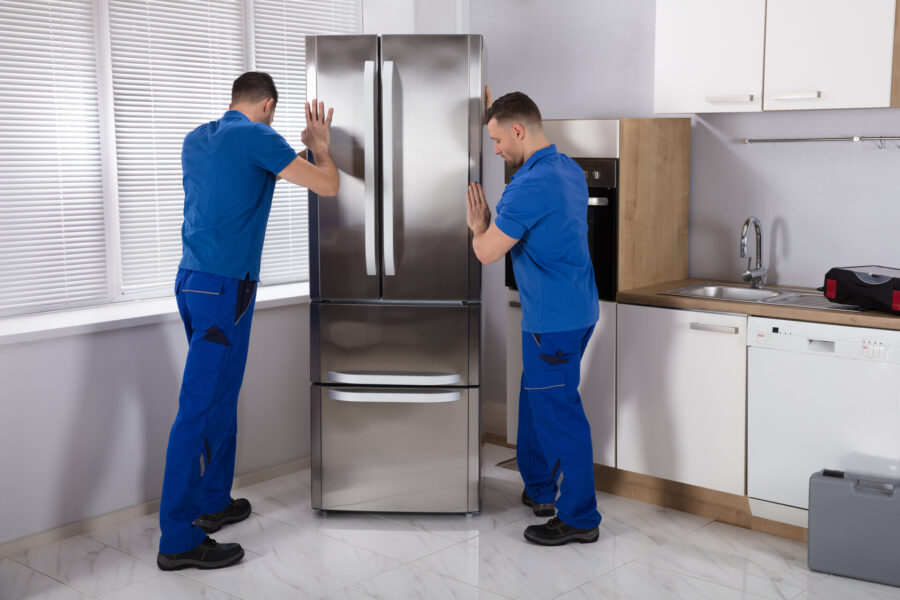If you don’t already have a system for getting your papers in order, now is the right time to learn one. We can help you find out how to organize important documents at home, where to store them and how to keep them organized even after the move. With our ingenious tips, social security cards, tax returns, or birth certificates should always be easy to find.

Why Is It Important to Know How to Organize Important Documents at Home Before the Move?
Learning how to organize important papers before the move is crucial for many reasons. First, it will be much easier to find everything you need once you are settled into your new home and start unpacking after the move. Second, it will help you to keep track of all of your important information and make sure that nothing gets lost in the midst of this process. Finally, organizing your files ahead of time will save you a lot of hassle when planning the move to another state since all records you may need will be in one place.
Can Cross-Country Movers Help Your Organize and Transport Paperwork to Your New Home?
Although getting long-distance moving services can facilitate the move immensely, it’s not a good idea to let movers deal with the paperwork. Since these papers usually contain sensitive information, it’s always better to keep them with the rest of your personal luggage as a part of relocation essentials. It should be done even if you choose a reliable cross-country moving company and believe entirely in your team. Remember – if your files are stolen or lost while in transit, you could be left without any proof of your ownership or identity, or you can become a victim of identity theft. Therefore, keep essential papers with you at all times to avoid additional relocation stress.
Start With Gathering All the Essential Records in One Place
Begin this process by making a big pile of every document you possess – don’t be intimidated by the amount that will materialize in front of you. But don’t lose hope! Soon you’ll realize that you have files that should have been thrown away months or even years ago.
Look everywhere you can to find all the paperwork in your home – desks, closets, nightstands, storage under the beds, kitchen junk drawers, and anywhere else that comes to mind. Make a thorough inspection of other areas, and don’t forget your old bags and purses. This action will simultaneously help you get papers in order and start the move-out cleaning process.
Once the Papers Are Gathered, Separate Them Into Several Piles by Their Type
The last thing you want to do is waste time worrying about the missing paperwork when faced with important life events and changes such as interstate relocation. But let’s face it – paperwork is among the most frequently overlooked items to pack. In order to keep crucial papers conveniently accessible and to give you peace of mind, it is best to divide them into several different categories. Here are some of the most important ones:
- Identity records and certificates – Passports, social security cards, birth and marriage certificates, and possible adoption paperwork belong to this pile. Your ID and driver’s license are also identity records, usually kept close to you at all times,
- Property documents – legal records, such as bills of sale for your personal property, including house and car, insurance papers, car registration, and mortgage paperwork,
- Medical files – health insurance policies, medical bills, medical history, and all other papers that provide any information about your health,
- Business documentation – if you’re relocating a business to another state, you’ll need to gather all the records concerning your company’s deals and transactions,
- Tax records – tax statements and returns as well as income records,
- Financial documentation – bank statements, processed checks, possible unemployment and disability files, retirement plans, and papers alike,
- Licenses – if you plan on getting a job in a new city, you’ll need your professional license easily accessible,
- School records – if you’re relocating with kids, you’ll need their school documentation to transfer them to a different learning establishment after the move. Additionally, school files are necessary if relocating to college is one of your reasons to move.
- The active papers you need for relocation – important phone numbers, relocation to another state checklist, reminders for appointments,
- Other papers – mail, receipts, coupons, ads, user manuals, newspapers, magazines, and other items.
How Long Do You Need to Store Papers?
There is no definitive answer to this question, as it largely depends on the type of papers in question. For instance, you may want to keep financial files for seven years, while birth certificates and other important files may need to be stored indefinitely. Ultimately, it’s up to you to determine how long you need to keep papers on hand and decide where they should become a part of your household inventory list. However, a good rule of thumb is to keep most paperwork for at least three to five years. This will ensure that you have them on hand in case you need them but won’t create an excessively cluttered home.
Still, there will be some papers you should declutter before you move to another city. Decluttering is a fantastic technique to organize your home’s papers before getting packing services and dealing with the rest of your belongings. Most of us have way too much paper clutter in our homes. Old bills, school papers, ads, magazines, and other types of paperwork can really add up over time, so make sure you get rid of them on time.
What to Do With Papers You No Longer Need?
The best way to get rid of papers you no longer need is to recycle them. If you decide to recycle, make sure to remove any staples or other fasteners that could damage the recycling machinery. Additionally, it would be best to shred the papers with sensitive information before recycling them to help protect your personal information. Make sure you do it before hiring a long-distance moving company and leaving your old home behind.
Packing Services
Our professional packers have methods and techniques to ensure all your items are intact during and after the move.
Car Shipping Services
We can ship your vehicles using the best freight options available. Your car will be moved safely and securely and arrive as planned.
Storage Services
Looking for storage space while you get settled? California-Seattle Express provides 30 days free storage with your move.
Where to Store Important Documents?
Once you have separated your papers and decided which files to save and which to throw away, you should keep the papers in a designated storage location. There are multiple options for storing these belongings, and which one you choose will depend on a number of criteria. So, how to store important documents at home? Each storing option has advantages and disadvantages, which are detailed below:
An accordion organizer
An accordion organizer can help you to keep your belongings organized and tidy. It is a great way to store your papers, especially if you have a lot of them. Accordion organizers come in different sizes, so you can choose the one that best fits your needs. There are also many different styles and designs to choose from, so you can find the perfect one to match your personality.
A file box
If you have a lot of papers to keep organized, a file box can be a great option. You can find file boxes at most office supply stores, and they come in a variety of sizes. When choosing a file box, make sure to get one that will fit all of your files. However, note that a box itself could be difficult to store because of its size, which is especially important if you’re relocating to a smaller home.
A binder
You will want to make sure that it is large enough to hold all of your files and made from your preferable material. Each type of binder has its own benefits, so choose the one that best suits your needs. Still, make sure you purchase the appropriate folders, so you don’t destroy valuable documentation.
A drawer
The biggest benefit of using a drawer to store paperwork is that it comes free of charge. However, it requires more organization on your part. Consider getting drawer separators for each sort of document. Still, if you want to know how to store important documents the best way and avoid relocation mistakes, you should go with some of the previously mentioned options.
A letter tray
Although a letter tray is another potential option, it’s by far the worst one as your important files would be exposed, inadequately secure, and prone to loss. Additionally, those trays would take up room on your desk and shelves.
If you’re not having a last-minute move and have enough time to be creative, you can always make your own document organizer. Still, before you start that project, make sure your DIY abilities are at an advanced level. Learn how to create a document organizer on your own with the help of the following video:
When Organizing Important Documents, Make Digitized Copies
Keeping physical copies of essential papers like birth certificates, passports, and insurance papers is often necessary. However, in this day and age, it’s also a good idea to create digital copies that you can store in the cloud or on an external hard drive. That way, if your physical copies are ever lost or damaged, you’ll still have access to them. Here is some suggestion on how to do so:
- Use a scanner or photocopier to create high-quality digital copies,
- Make sure to save your digital copies in multiple formats (like PDF and JPG) and locations (Cloud, external hard drive, etc.),
- Use a password-protection or encryption program to protect your digital copies from being accessed by unauthorized individuals,
- Regularly backup your digital copies to ensure they are never lost.
Make a single folder where you will store everything else. If you don’t have a photocopier or scanner, it would be a good idea to use specially designed scanning software like VueScan or, for example, Evernote.

How to Keep Important Documents Organized the Right Way?
It’s not enough to organize papers just once and not revisit your papers ever again – that’s how your clutter is created in the first place. You’ll have to add new ones to suitable categories and remove the outdated ones.
Birth certificates, financial arrangements, and other similar papers are some that you must keep forever; however, you can discard other paperwork a month or two after receiving them (utility bills, for example). You should save receipts for larger purchases (such as TV, computer, and similar items) until the warranty on those items expires. However, remember that you should keep your tax files for around seven years!

After Learning How to Organize Documents, It’s Time to Deal With Your Other Belongings
After you have your papers in order, it’s time to deal with the rest of your stuff. This can be a daunting task, but it’s important to get rid of anything you don’t need or use before long-distance movers come. Organizing and packing your stuff before the move is essential when relocating to a new home. Luckily, for this part of relocation day preparations, you can hire a cross-country moving company to help you pack and move efficiently. Therefore, ensure to research the best movers from Seattle to California (or movers from California to Seattle), and secure yourself a smooth, easy, and stress-free transition.




